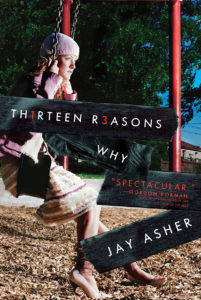 13 Reasons Why Can Help You be a Better Role Model
13 Reasons Why Can Help You be a Better Role Model
by: Dr. Bill Clark
“Artists always get there first!” – Dr. Steve Garber, author of The Fabric of Faithfulness
The past few weeks we’ve walked through a series called “Reasons to Engage,” focused on the popular Netflix series, 13 Reasons Why. If you’re just joining us, I’d encourage you to read the complete series here.
The reviews for the Netflix’ show, 13 Reasons Why, range from glowing, to dismissive, to highly critical. Obviously, adults are cautioning kids about the graphic nature of the show and the seriousness of the topics—especially teen suicide—while some parents are prohibiting watching altogether.
Understandably, everyone fears a rash of suicide threats or attempts, or an increase in victimizing behaviors after being exposed to the show. While these warnings about the show seem valid, the prohibitions seem overly cautious and short sighted.
The series, and the story behind it, is not trying to encourage violence towards self or others. It’s actually quite the opposite.
The Creative Liberties of a TV Show
The series, and the story behind it, is not trying to encourage violence towards self or others. It’s actually quite the opposite. But we humans can twist anything.
Generally, the book, 13 Reasons Why, is seen as a positive work. Students have been reading it for 10 years. Here’s what one critic points out:
While the Netflix series has been controversial, the book “13 Reasons Why” got rave reviews when it was published in 2007. The book was mildly controversial—the American Library Association lists it as one of the Top 10 Challenged Books for 2012—but it also spent time on the New York Times children’s chapter book bestseller list. Author Jay Asher noted in the book’s Q & A section that parents and teachers have told him they use the book as a tool to talk about bullying and suicide. He also mentioned young people who reached out for help after seeing themselves in Hannah Baker, the book’s protagonist, who commits suicide and leaves behind a series of cassette tapes detailing why.
 Netflix took liberties with the material and presented a much longer and more graphic version of the story – enhancing the impact and planting strong imagery in sensitive minds and imaginations.
Netflix took liberties with the material and presented a much longer and more graphic version of the story – enhancing the impact and planting strong imagery in sensitive minds and imaginations.
Let’s take a look at this one powerful example. In the book, Hannah commits suicide by taking pills and there is not a scene involving her parents finding her. In the Netflix version, her arm slitting scene is disturbingly graphic and the scene of the parents finding her is absolutely gut wrenching.
Therein lies the risk and problem with the show; it is too potent for some viewers which can mislead them, especially if they cannot process it.
Prepare yourself before attempting conversations with kids.
If you are considering watching the show or attempting conversations about it, read reviews. Get a feel for what professionals, parents, and even kids are saying about the show. Generally, I have found that the message and the acting of the Netflix series are praised while the plot, the length, the annoying setup for season 2, and the simplistic portrayals of high school, receive mixed reviews at best. I concur.
But reason number four is not, “watch this so you can give your kids your review!” In fact, if you are a Christian, you should especially avoid this temptation. When Christians review literature, art, film, etc. they can be quite helpful, pointing to underlying eternal themes, the human dilemma, or the call to action. But Christians can also come off as pedantic, self-righteous, fearful, demeaning, and shaming. They treat others as if they couldn’t possibly know what is morally good or proper.
I don’t think the church needs to be ‘hip’ or ‘cool’ to fit in. But [it] does need to be respectful and deeply appreciative of artists trying to portray truth.
The result is that the “church” worsens its reputation in the world. I don’t think the church needs to be “hip,” or “cool,” to fit in (ironically, this is one of the sub-themes in the show), but the church does need to be respectful and deeply appreciative of artists trying to portray truth.
Reason 4: Watch the show because it will give you a chance to model a spirit of openness, respect and curiosity about what the world and its artists are trying to tell us. It will tell your kids that you are not closed-minded, simplistic, reactive, and fearful. It may help your kids see that you can exercise judgment without being judgmental.
It may help your kids see that you can exercise judgment without being judgmental.
Instead, watch the show with respect for what the artistic community is trying to do in shows like this. Watch it objectively, but non-judgmentally (to the degree we can). Imagine being a kid watching this, or better still, a kid experiencing some of what these kids experienced. Let your kids educate you about their world, the morality in their world, the moral choices they face — not the ones you want them to face. Model the awareness of life, and the openness to hear about that life that Jesus reflected, “Come to me, all you who are weary and burdened…”
Please leave any questions you have or comments below.
